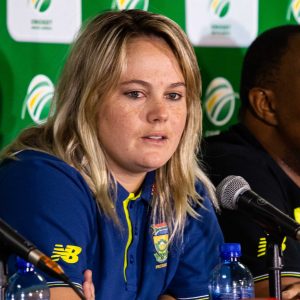Football can help tackle gender-based violence
A number of stakeholders agree that the beautiful game could play a critical role in confronting violence against women in South Africa. But is the sport capable of overcoming its demons to do so?
Author:
7 May 2020

“Football cannot change the world, but it can be a part of the process,” political writer and former Swedish footballer Gabriel Kuhn writes in Soccer vs. the State: Tackling Football and Radical Politics.
While the beautiful game didn’t change the world in countries like Algeria, Ivory Coast and South Africa in their times of difficulty, it played a part in the process. Take Algeria, for example, where football and resistance have always gone hand in hand. Their senior men’s national team, the reigning African champions, hold a special place in the hearts of Algerians.
The football team is older than the country. Known as Equipe FLN then, it was founded in 1958 as part of the National Liberation Front (FLN) army that fought for independence from France, which Algeria gained in 1962. Equipe FLN showed their colonisers that Algeria could stand on its own, including on the football pitch, where a number of Algerian footballers boosted the French team. Equipe FLN played around the globe, using football as a vehicle to drive home their pan-African message and ambitions of autonomy.
The 12 players who slipped out of France to form the team are immortalised in Algerian history. Their act led to the national team, now known as the Desert Foxes, occupying a mythical place in the country as a symbol of resistance and patriotism.
Early in 2019, chants from football stadiums reverberated across Algeria in the protests that led to the resignation of former president Abdelaziz Bouteflika, who wanted to run for a fifth term despite his poor health. Football fans, and their songs, were a catalyst in the peaceful protests that overthrew the 83-year-old who had ruled the North African country for 20 years.
Related article:
Football didn’t change the world in Algeria, but it played a part in the process. As was the case in Ivory Coast.
Didier Drogba and his Ivorian teammates, on their knees and with their arms around each other, used the occasion of their qualification for the 2006 Fifa World Cup to plead with their countrymen to end the civil war that was ravaging Ivory Coast.
“Men and women of Ivory Coast,” Drogba pleaded. “From the north, south, centre and west, we proved today that all Ivorians can coexist and play together with a shared objective: to qualify for the World Cup. We promised you that the celebration would unite the people. Today, we beg you, please, on our knees. Forgive! Forgive! Forgive. The one country in Africa with so many riches must not descend into war like this. Please, lay down all weapons. Hold elections. All will be better. We want to have fun, so stop firing your guns.”
A peace agreement was signed two years after Drogba’s moving speech inside the Al-Merrikh Stadium.
Stadiums and political gatherings
A footballer’s speech might not have brought peace in South Africa during its fight against apartheid, but football and its stadiums played some role in dismantling the murderous regime that divided the country along racial lines. Football not only gave the black majority hope and an escape during the trying times but its stadiums were also fertile ground for political engagement when political gatherings were banned.
While rugby and cricket were played along racial lines, with the apartheid government using the Springboks to spread its propaganda, football defied this regime.
“Football as a sport is important in that it brings everybody together. Football has taken the lead [before]. During the days of apartheid, it was the only sport that opened up and became non-racial despite the order of the country at the time,” said Kaizer Chiefs club chairperson Kaizer Motaung.
Football in the country has a history of being more than a game, standing up to tyranny and fighting for what is right. It has always had a sense of conscience, which is why it’s befitting that it should play a central role in the country’s biggest fight in post-apartheid South Africa: gender-based violence. There is virtually no place that is safe in South Africa for women. Not stadiums or taxi ranks, post offices or universities. Not even their homes.
There were more than 52 000 cases of sexual assault reported to the South African police between 1 April 2018 and 31 March 2019. In the same period, the police recorded almost 180 000 contact crimes against women, with just over 82 000 of these being common assaults and more than 54 000 being assaults with the intent to cause grievous bodily harm. The statistics also reveal that 2 771 women were murdered in those 12 months, with 3 445 cases of attempted murder of women.
The police recorded 2 300 cases of gender-based violence in the first week of the government’s Covid-19 lockdown from 27 March. These numbers paint a grim picture of what women endure in South Africa, but more worrying is that they don’t paint the full picture as these are only the recorded cases. Many go unreported amid the strong sense in the country that the justice system fails to protect women.
This is where the sport with a history of doing what is right, the sport that has the largest reach and a following made up mostly of men comes in. “Football has to take to the lead” in the fight against gender-based violence, Motaung said. “Women are very important people in our lives. We are where we are today because of the sacrifices they made when we were still babies. They’ve got a critical role to play in our lives. It is important that we treat them with the utmost respect that they deserve.”
But this is seldom the case. Football is filled with misogyny. And when those in power try to spread positive messages, their tone is peppered with patriarchal views, reducing women’s importance in society to their ability to give birth and their relation to – or relationship with – men.
Related article:
“Football has an important role to play in this fight” against gender-based violence, according to Nonhlanhla Skosana, the community education and mobilisation unit manager at non-governmental organisation Sonke Gender Justice.
“Clubs need to do more to engage with their fans and the communities they reach,” she said. “But players, as men, also need to hold each other accountable. It’s no use just saying something and not living it. Clubs also need to work with organisations like us [Sonke Gender Justice] in shaping the messages that they spread against gender-based violence. Some of the messages that are put out tend to be done in a very insensitive way or push gender stereotypes.”
Additionally, the women who work in the sport face a number of challenges, purely because of their gender.
Fighting sexism in the sport
Khathochelo Mbanda is the team manager of GladAfrica Championship side University of Pretoria FC. She grew up in the beautiful game, playing football with her brother and his friends from a young age. She went on to captain the women’s team at the University of the Witwatersrand and graduated to working at Bidvest Wits in their marketing, media and match-day coordination departments.
“It hasn’t been an easy ride, the obvious reason being that I’m a woman in a male-dominated space,” she said. “The challenges are many, like being undermined because, what do you know about football? Sexism is a big problem. You are seen as a sex symbol first, not as an individual who is capable. Being a young female has also been a challenge as most of the people in football are older and have been in the game for long.
“But when you believe in yourself as an individual and know why you are there, you will grow and succeed. I was fortunate to have worked and still work with men that saw me as a young person who is capable and they believed in me, men like Ntate George Mogotsi [at Wits], Rendani Mulaudzi and Kenneth Neluvhalani [both at AmaTuks].”
AmaTuks is renowned for grooming the next generation of stars, not only in football but in other sporting codes that have turned the institution into a sporting juggernaut. “At Tuks we believe in an athlete-centered programme,” Mbanda said.
“In this regard for football, the programme is player-centred and coach-driven. This means we care about the wellbeing of the player outside of being just a football player on the field of play. We have wellness sessions with the players, these include psychology. Also, the technical team plays a huge role.
Related article:
“We have a non-written policy that we always communicate with the players, and that is, you can talk to the coaches, myself or anyone you are comfortable with within the club if you have any personal challenges. We need to know so we can know how to assist. At AmaTuks we are a family, so the wellbeing of everyone is very important. We strive to build better human beings, not just footballers.”
A number of football administrators that New Frame spoke to agreed that the beautiful game must play a leading role in the fight against gender-based violence. “Football must tackle the problem head-on,” said Tim Sukazi, the club chairperson of GladAfrica Championship side TS Galaxy, based in Mpumalanga.
“There are a number of things that the industry should do. Firstly, most of their games are televised for an audience of millions, with thousands at the stadium. That’s an opportunity to send a loud and strong message by speaking out against this before the match and even using perimeter boards across the pitch. Clubs should also do more in the communities where they come from, which includes using supporters’ branches, who have a bigger reach and are closer to the public they serve.”
What is the PSL doing?
Most of these things are already being done. “SAY NO TO FEMICIDE” is written on the perimeter boards in professional football matches. The sponsor of the premier division league, Absa, runs a campaign about violence against women. But these gestures are meaningless without concrete action to back them up. So what is the Premier Soccer League (PSL) doing to address the issue?
“We have joined up with Father Smangaliso Mkhatshwa on moral regeneration, because any other issues we have identified are not good enough,” said PSL chairperson Irvin Khoza, referring to the Catholic priest and former Tshwane mayor’s Moral Regeneration Movement.
“We have to re-examine our value systems because the value system helps to inculcate or nourish the conscience, to have something that is reminding you that what I am doing is incorrect. If that inner voice is not there, whatever message we come up with lands on a barren ground. The issue of moral generation is the one that I think that we must explore, which I think is fundamental in making sure that we self-regulate.”
Khoza continued: “If we don’t have that, any other thing or message will not help us because people today, you can’t talk to them. They are influenced by social media. They are influenced by their own phones, which is talking to them alone. They take decisions on their own. How best now do we cut across that and still appeal to the people on the issue of moral regeneration, because morality is a very important thing? It is under threat … How do we revive this? It’s what I saw happening in Japan, we were told that kids from four to eight years old are taught values.
“Do we do the same thing here at home? We used to attend missionary schools, where we would also go to church. How many of us are going to church now? Very few people are going to church. Where is the source of reviving those moral values? We don’t have it. Some would say that maybe I don’t think that the issue of moral regeneration is the only solution, but it might be of help to ensure that the moral value and moral fabric will assist to increase the inner voice when you go astray. That’s what we think at the moment.”
Related article:
Looking at the matter purely on moral grounds is simplistic and ignores the fundamental challenge of gender-based violence: justice. The government has been criticised heavily for not doing enough to punish perpetrators. A report published in 2017, titled Rape Justice in South Africa: Retrospective Study of the Investigation, Prosecution and Adjudication of Reported Rape Cases from 2012, showed that only 8.6% of the 3 952 cases the writers looked at, which were reported at 170 police stations across the country, led to a conviction.
Kick abusers out?
The justice system is not the only problem. Sport also tends to look the other way when its star athletes are involved in rape or domestic violence. But some organisations do have policies when it comes to punishing their players.
The National Rugby League (NRL) in Australia and National Football League (NFL) in the United States are among those that have domestic violence policies. The NFL hasn’t always come out squeaky clean when its players face charges of domestic violence, even when there has been video evidence. But it has since refined its policy. For example, the league now doesn’t need to wait for a criminal case to be opened for it to investigate and impose sanctions against players, including a six-game suspension. And last year, the NRL kicked Ben Barba out of the league over allegations of domestic violence.
Is this something the PSL could consider? “But that’s not the solution!” Khoza interjected. “Let’s deal with the problem. The problem is that the inner voice is not there. You cannot talk about symptoms. Talk about how to help the person to manage himself. All of us, we’ve got that problem right now. We don’t know what’s right and wrong. In the presence of our elders, we just use vulgar [language]. It’s normal.
“When you go to Twitter, people just insult, it’s normal. When things are haunting us now, we want to blame other things. To expel someone is just the easy way out of it, you are not solving the problem. Let’s deal with the problem. What is it that can help us to bring back self-regulation?
“All of this is about self-regulation, because if you want to do this thing [abuse your partner] and you hear that voice, you can’t do it. If the voice is not there, what’s the point. We’ve expelled you, what did we solve? Today, I am going to be a serial killer. Did we solve the problem?”
Khoza also chairs Orlando Pirates, the second most supported football team in South Africa, and he is not the only club chairperson who is against kicking out players because of domestic violence. “The problem is that there might be genuine cases, but there may also be other cases where women are used to frame people because of various reasons,” said Motaung, whose Chiefs enjoy the lion’s share of supporters in the country.
“There are people who are out there to make money and some of these girls are used. Yes, it shouldn’t happen, but if it does happen then the necessary steps must be taken to deal with it. But we also have to be very vigilant of those who are using the violence issue to extort money from people, because it is very common.”
It’s revealing that Khoza and Motaung focus on the perpetrators rather than the victims and, more importantly, justice.
Related article:
Highlands Park club co-director Larry Brookstone agrees that football has a significant role to play in the fight against gender-based violence but, like Khoza, doesn’t see kicking abusers out of the game as a solution. “The problem is that you kick the person out of the sport, but you don’t kick the gender-based violence out of the person,” he said.
“Because you’ve got it out of your sport and have washed your hands off it, you are allowing it to continue [somewhere else]. Rather, if it’s identified, a productive organisation or club should try and counsel the person to help them modify their ways and get the situation rectified. It’s just a view, because I wouldn’t want to see it duplicated. This doesn’t just go away. When you ostracise the person by taking them out of the sport, they become more angry and more prone to doing these things.”
Sonke Gender Justice has partnered with footballers such as Edward “Magents” Motale, who was the captain of Pirates when they won the 1995 Africa Cup of Champions Club tournament. They have programmes in the Western Cape, Eastern Cape, Mpumalanga and Gauteng where they use football to drive home the message to young boys that gender-based violence is not okay.
Skosana agreed with some of Brookstone’s sentiments, but said “it is important to engage the police and ensure that the perpetrators are brought to justice”. She added that “what should be done shouldn’t just be punitive, a lot must be done in terms of prevention. There must be gender transformation in clubs and strong leadership to deal with the matter when someone is implicated.”
The need to change from within
There hasn’t been strong leadership on display in the past, when South African footballers have been accused of domestic violence. The abuse of a partner, statutory rape or allegedly stabbing a woman with a screwdriver haven’t deterred clubs from signing or holding on to talent.
Former Santos player Jeremy Jansen – who served four of the eight years to which he was sentenced for abduction, attempted rape and assault with the intent to do griveous bodily harm – found a club to train with a week after his release from prison. And Tjovitjo by Brickz is blasted at the start of most football games, despite the kwaito star being convicted of statutory rape and imprisoned.
A club in the premier division of South African football known to New Frame did nothing when provided with evidence that one of their players was sexually harrasing a woman he had also tried to rape. This makes the messages clubs are putting out look like the mere ticking of a box rather than a genuine will to instigate change. They say one thing, but do another.
The bigger the player, the more untouchable they are when they break the law. It’s one of the many things football must address if it wants to play a meaningful role. If the sport is to join the fight against gender-based violence, it has to start within.
“Being a female sports reporter in South Africa is like walking on landmines most of the time,” a woman who works as a journalist told New Frame, speaking on the condition of anonymity.
Related article:
“I love being a sports journalist and I’m good at it,” she said. “Just like in any space, coexistence should not be a negotiation. I also know women who have quit and it had nothing to do with their competence but the abusive culture of men in this industry. Things must change. I have stopped apologising for being ‘too loud, too hard, too bossy, too ugly, too fat, for overreacting, for being emotional, for being personal, for not letting it go’.
“We cannot be expected to step out of our womanhood every time we go to work, for the comfort of insecure men. There are so many heartbreaking stories about black women’s endurance in this field and again, that inaffordability of freedom of speech also makes us inaccessible to each other as women. It is too big a damage because we have no one to turn to. It is like the system has been designed to divide and conquer women. With that said, I am not going anywhere. I am here to tell stories of African people, their hopes, their dreams, struggles and triumphs.”
Football will not change the world in which women in South Africa live, but it can be a part of the process, like it was during the fight against apartheid. “Football has a big role to play in assisting to curb the gender-based violence in our country,” Mbanda said.
“We need to educate our players, staff and fans on this topic. We need to create programmes and platforms to expose them to the role women play in our lives and the importance of respecting them. This is part of the psychological wellbeing of the team. Gender-based violence is not only physical, it is in the way they look at women, how they talk to them … Women are not just sex symbols, we are much more than that.”
Football’s hand in domestic violence
Football’s power, its blind loyalty and devotion from millions of fanatics, is also its weakness when it comes to doing the right thing. Football poet Eduardo Galeano, who died in 2015, put it succinctly in Football in Sun and Shadow when he wrote: “In this sacred place, the only religion without atheists puts its divinities on display.”
The fanaticism around football can be dangerous. People have lost life and limb in the bloody rivalries that stretch from Buenos Aires to Zagreb. But it’s not just the ultras who suffer, there is research that has linked football matches to a spike in cases of domestic violence.
Related article:
Research by academics in Lancashire over three World Cups – in 2002, 2006 and 2010 – found that domestic abuse in the area increased by 38% when England’s national team lost. Those numbers increased by 26% when England won or drew. It also found that incidents of domestic violence increased by 11% the day after the Three Lions played. The Nation magazine reported that in Colombia, domestic violence rose by 38% and 25% when their national team played at the 2014 and 2018 World Cups respectively. Those figures rose by nearly 50% in the 2015 Conmebol Copa América tournament.
Football does not exist in a vacuum. In most parts of the world, it’s a reflection of society. The racism, homophobia, xenophobia and misogyny in football terraces is also seen in the streets. But because of the power it has, bringing more than a billion people to a standstill when the World Cup is in progress, the beautiful game can play a significant role in addressing social ills.
For that to happen though, those in power cannot only say the right thing. They have to do the right thing by holding each other and the players accountable. In doing so, football will continue to play a significant role in the process of changing the world.







